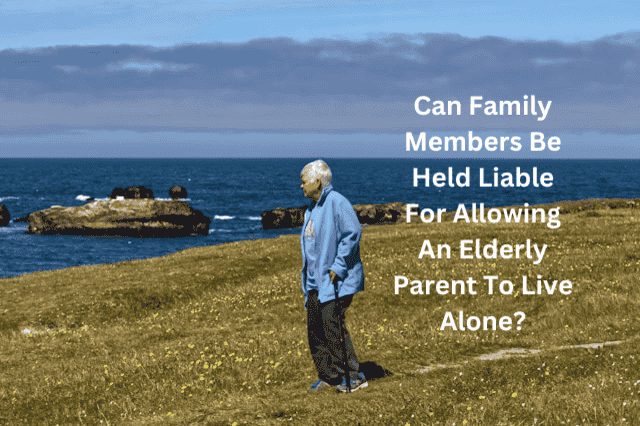If you are wondering whether family members can be held liable for allowing an elderly parent to live alone or not, you’re not alone.
The short answer is: According to Islamic law and filial-support laws, family members (specifically children) are liable for allowing their elderly parents to live alone. However, in some countries and states, there is no legal liability for family members in such cases. If you are in one of these regions, it’s totally up to you whether you will support and care for your elderly parents or not. In these areas, social and health services are responsible for providing the necessary care and support.
Children are motivated to care for their elderly parents due to love, gratitude, cultural and religious beliefs, moral responsibility, guilt, social pressure, a desire for stronger family bonds, compassion, and peace of mind.
My suggestions:
I will suggest you care for your elderly parents as much as possible as they cared for us when we were unable to eat and walk without their help at our earlier age of life. If you are unable to take care of them due to your busy schedule, keep caregivers so that they never feel alone and helpless.
Explanation:

The relationship between parents and their children is filled with complexities, highs and lows. It is indeed filled with a lot of drama as minds and opinions clash. This is often blamed on generational differences in the environments they grew up in. One of the issues that come up is whether family members, such as children, are responsible for the care of their elderly parents. Can family members be held liable for allowing an elderly parent to live alone? Answering this question will require a discussion of the religious, legal, cultural, and ethical aspects of this relationship.
Read more:
- How Are The Greek Values Of Family And Perseverance Shown Through Odysseus’s Return Home?
- What Counts as a School Accident, and When Can Parents Take Legal Action?
In general, family members are not liable for elderly parents living alone. They are free to do what they want and live where they want. This is, in fact, the lifestyle of many in the Baby Boomer generation. Some elderly parents may feel this is an invasion of their privacy, abuse, or exploitation because family members are intruding into their lives or well-being. Most countries then leave this matter to families to discuss amongst themselves. However, there are many countries such as Singapore, Bangladesh, China, and India, even in the 30 states of the USA, that have enacted filial support laws in order to protect and care for their elderly citizens. However, in 11 states of the USA, these filial support laws have never been applied.
What is Fillal support law?
Filial support laws basically require adult children to provide financial assistance to their parents if the parents are unable to do so for themselves.
It is not a coincidence that the countries with filial support laws are all in Asia. Asians have been known for their filial piety, which, according to dictionary.cambridge.org, means “the idea that parents, grandparents, and older people should be treated with honor and respect.” Caring for elderly parents become a moral obligation for family members, especially children, because doing so is a show of filial piety. Hand in hand with the moral aspect is the ethical aspect of the issue, wherein children feel that the natural thing to do is to care for their elderly parents because they were the ones who raised and nurtured them. Children should, in return, care for their elderly parents, no matter what, because it is the ethical and moral thing to do.
What to do when you are unable to care for your elderly parents?

When you find yourself unable to care for your elderly parents due to time, distance, or personal limitations, there are several steps you can take to ensure they receive the care they need:
Assess their needs:
Start by evaluating your parents’ physical, emotional, and medical needs. This will help you understand what kind of support is required, whether it’s daily assistance, medical care, or just occasional help.
Involve family members:
Reach out to other family members to discuss the situation. Siblings or extended family may be willing to share responsibilities or provide financial support.
Consider professional caregivers:
Hiring in-home caregivers or a visiting nurse can help manage daily tasks like meal preparation, medication management, or personal care. Agencies often offer flexible options to suit your parents’ needs.
Use community resources:
Many communities offer support services for seniors, such as adult day care centers, meal delivery, or transportation assistance. Contact local senior centers or government programs for more information.
Financial and legal planning:
Make sure your parents have their financial and legal affairs in order, including power of attorney, health directives, and wills. Consulting a financial planner or elder law attorney can provide guidance.
Support groups and counseling:
Caring for elderly parents can be emotionally draining. Joining a support group or seeking counseling can provide emotional relief and helpful advice from others in similar situations.
Explore respite care:
Respite care services provide temporary relief for caregivers. This can be a good solution if you need a break or are temporarily unable to provide care.
Each family’s situation is unique, so finding the right solution might involve combining several of these options.
Summary
Legal, Culture, morals, and ethics have dictated that it is proper for family members to care for their elderly parents. Some laws even command this to their citizens. If all parents were the same nurturing and caring people that they ought to be, then this decision would come naturally. No one family is the same. Every family member’s experience is different from another. Sometimes, they would rather keep this distance from their parents to keep the peace. Family members with strained relationships should not be faulted for this.
In the end, it is best that both family members and elderly parents communicate properly. The elderly parents should always be respected and should be followed as to how they want to live. They should not be forced to do something out of their will. Likewise, family members should not feel obligated to care for them unless there is an urgent need to do so. Balancing the family member’s circumstances, societal support and the elderly parent’s need for autonomy is the ideal formula to get everyone appeased so that no one is held liable.

